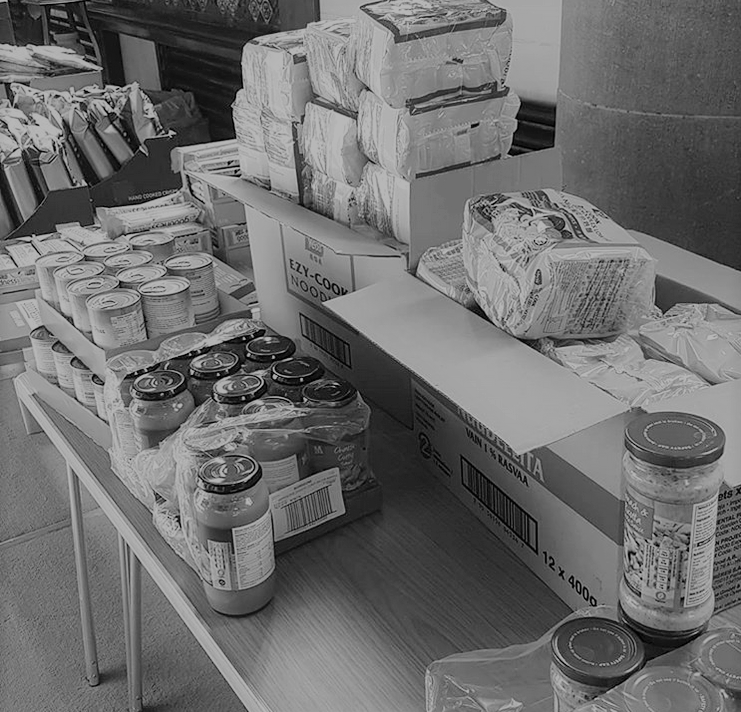Associate Research Fellow Greg Smith reflects on a holiday hunger programme in Preston and the Biblical principle of manna.
Over the past few weeks, a major part of my work has been to develop a holiday hunger programme as a partnership between Preston City Council, local churches, and schools. This is one of several different initiatives in our city, across the county, and throughout England in which colleagues at the Church Urban Fund Together Network have played a significant part. In our own parish in inner-city, multi-cultural Preston we are delivering weekly holiday markets aimed at families who are struggling in the absence of free school meals.
The markets work in partnership with Fareshare, who gather and redistribute industrial quantities of food that is surplus to the requirements of major supermarkets and food manufacturers. Each week, we order and collect several car loads of produce—including vegetables, fruit, bread, dried goods, and tinned food—and set up market stalls in the back of our church. Local primary schools advertise the service and encourage parents whom they know to be vulnerable to come along with their shopping bags. There is no means test; any family can come and take what they need on the basis that they make a donation as they feel able. Any money collected is then used to pay Fareshare a nominal fee for the food they have provided.
This market model has several advantages over the traditional food bank. First, customers have a choice—albeit a limited one—rather than having to accept a standard food parcel which may include items they would never eat. Secondly, since the market is open to all, there is no stigma in attending. Thirdly, the pay as you feel able principle gives customers some dignity in allowing them to make a contribution. Fourthly, there is an emphasis on fresh and healthy food. And finally, we try to make the sessions relationship based, offering a brew, some conversation, supportive friendly volunteers and a few games and activities for children who come. These principles are now being promoted in the emerging food pantries movement, promoted by Church Action on Poverty, which seeks to offer a more participatory and holistic alternative to the standard food bank model.
Although well over a million people make use of food banks, the food poverty crisis is only the tip of the iceberg in the context of growing food insecurity. News coverage suggesting that the government is making plans to stockpile food for use in the eventuality of a disastrous end to the Brexit negotiations, shows how the dependency on global “just in time” food supply chains has introduced unacceptable risks. The recent shortage of carbon dioxide for fizzy drinks is just one example of what can happen when a complex system breaks down and chaos ensues. While global markets have ensured remarkable consumer choice in foodstuffs, they can also be critiqued. Problems include: damage to local economies, the environmental cost of food miles, the concentration of power and control in the hands of a small number of multinational companies, and the health and well-being impact of reliance on processed food, ready meals and takeaway pizzas.
It may be unrealistic and indulging in nostalgia to advocate a return to the simplicity of former times, where each family ekes out a subsistence lifestyle from food produced on its own wee croft. Yet the possibility of a radical shift in the food economy deserves proper consideration. Local, less intensive agriculture, together with a move away from unsustainable methods of fish, meat and dairy production could bring significant benefits to the global environment and individual health. And a change of attitude, where food is seen as more than a commodity, and eating regains something of a social and sacramental function, could even be good for our souls. As Jesus said, human beings cannot survive on bread alone.
Recent lectionary readings of the story of the feeding of the multitude have reminded us of the manna principle, which is paradigmatic for the Christian understanding of food. Firstly, food is a gift from God, intended to supply the needs of all the people; enough for each and enough for all. There is some work to be done in gathering and distributing the food, but not so much work that one must break the Sabbath day, or year. Biblical wisdom means that there is no need to reap the margins of the field and neglect the needs of widows, orphans and migrants in the land. No-one needs to drive slaves, or employ harvesters, or seasonal migrant labour, at unjust rates of pay. While a Joseph can prudently manage food stocks for the long term, there is no wisdom in entrepreneurs building bigger barns in the hopes of making a fortune when prices respond to scarcity. It may be that applying these ancient principles in the modern economy could lead to a more equitable and sustainable solution for 21st century food policy.
To find out more about the Church Urban Fund Together Network, and to support this in your prayers, a prayer guide is available here.
More blogs on religion and public life…
#ThesePeople
Rosie Dawson
Reciprocity, Risk and Reimagination: Theology and Social Enterprise in the NE
Valerie Barron
The Anthropocene: Disrupting all our Stories
Matthew Stemp
Vicky Beeching: Undivided and Undeterred
Simon Reader
More blogs on religion and public life
- “Barnabas Thrive” led by Revd Dr Paul Monk, is awarded Kings Award for Voluntary Service
by Matthew Barber-Rowell - How could a Temple Tract have had even more traction?
by Simon Lee - Remembrance Day: Just Decision Making II
by Matthew Barber-Rowell - Trustees Week 4th Nov – 8th Nov 2024
by Matthew Barber-Rowell - Some ancient wisdom for modern day elections
by Ian Mayer


Discuss this